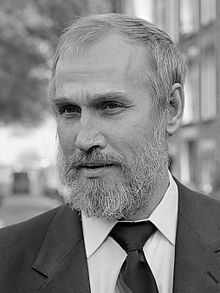Working Commission to Investigate the Use of Psychiatry for Political Purposes
Рабочая комиссия по расследованию использования психиатрии в политических целях | |
| Formation | 5 January 1977 |
|---|---|
| Founder | Alexandr Podrabinek |
| Publication |
|
Parent organization | Moscow Helsinki Group |

The Working Commission to Investigate the Use of Psychiatry for Political Purposes (Russian: Рабо́чая коми́ссия по рассле́дованию испо́льзования психиатри́и в полити́ческих це́лях) was an offshoot of the Moscow Helsinki Group[1][2] and a key source of information on psychiatric repression in the Soviet Union.[3]
Private staff
The commission was established on 5 January 1977 on the initiative of
Investigating activities
The task stated by the Commission was not primarily to diagnose persons or to declare people who sought help mentally ill or mentally healthy.
The commission gathered as much information as possible of victims of psychiatric terror in the Soviet Union and published this information in their Information Bulletins.
Foreign reactions
Over fifty victims examined by psychiatrists of the Moscow Working Commission between 1977 and 1981 and the files smuggled to the West by
Forcing shutdown
Members of the Working Commission have been stifled through exile and imprisonment.
The arrest of Koryagin puts a definite end to the humane and legal activity of the Working Commission to Investigate the Use of Psychiatry for Political Purposes, and gives rise to the fear that the authorities intend to increase their use of psychiatric persecution for political reasons.
References
- ^ Reddaway, Peter (23 February 1978). "More psychiatric terror". The New York Review of Books.
- ^ Burns, John (26 July 1981). "Moscow silencing psychiatry critics". The New York Times.
- ^ Алексеева, Людмила (2013) [1979]. "Путеводитель по аду психиатрических тюрем" [The guidebook to the hell of psychiatric prisons]. Kontinent (in Russian) (152).
- ^ Miku, Natalya; Molkin, Alexey (2015). Консультант правозащитной ассоциации "Рабочей комиссии по расследованию использования психиатрии в политических целях"—врач-психиатр А.А. Волошанович [The consultant of human rights association "The Working Commission on Investigation of Use of Psychiatry in Political Goals "—Psychiatrist A.A. Voloshanovich]. Современные научные исследования и инновации [Modern Scientific Studies and Innovations] (in Russian) (3).
- ^ ISBN 978-90-420-3046-6.
- ^ a b "The spread of Soviet suppression". New Scientist. 78 (1104): 493. 25 May 1978.
- ISBN 978-0-8020-9140-6.
- ISBN 1-85649-104-8.
- ^ ISBN 90-72657-01-2.
- .
- ^ ISBN 978-90-420-2585-1.
- ISBN 0-8133-0209-9.
- .
- doi:10.1192/pb.3.1.5.
- ISSN 0262-4079.
- ISBN 978-0226226286.
- ^ a b Bonner, Yelena; Kalistratova, Sofiya; Kovalyov, Ivan (29 July 1981). Документ № 176. Осуждение последнего члена Рабочей Комиссии по расследованию использования психиатрии в политических целях Феликса Сереброва [Document Nr 176. The conviction of Feliks Serebrov, the last member of the Working Commission to Investigate the Use of Psychiatry for Political Purposes] (in Russian). Moscow Helsinki Group.
- PMID 6402080.
- ^ Bonner, Yelena; Kalistratova, Sofiya; Kovalyov, Ivan; Meiman, Naum (5 April 1981). Документ № 162: Арест Анатолия Корягина [Document Nr 162. The Arrest of Anatoly Koryagin] (in Russian). Moscow Helsinki Group. Archived from the original on 2 June 2010.
- A Chronicle of Current Events(62). Amnesty International Publications: 19–26. 1982.
Further reading
- "Persecution of the Working Commission (on Psychiatric Abuse)" (PDF). A Chronicle of Current Events (59, 60, 61). London: Amnesty International Publications: 131–139. 1982. Archived(PDF) from the original on 4 July 2015.
